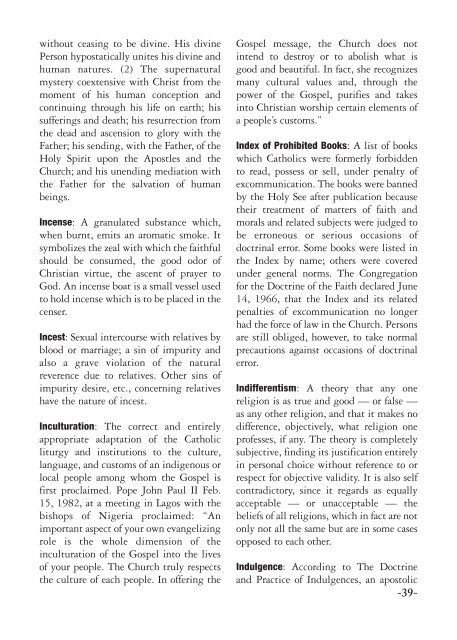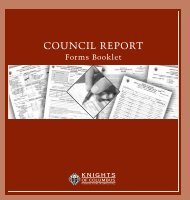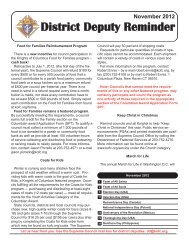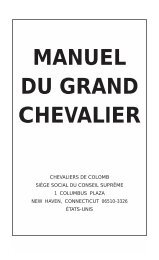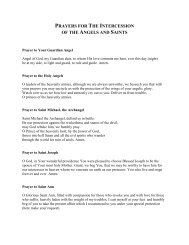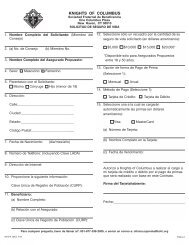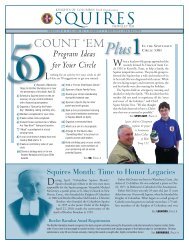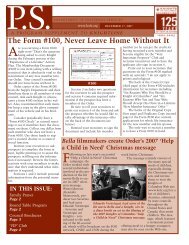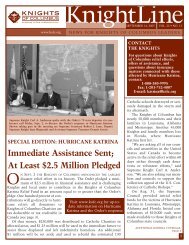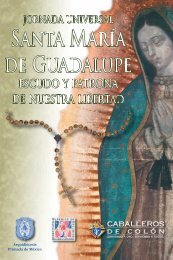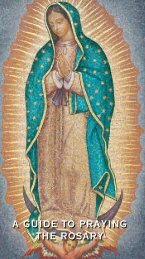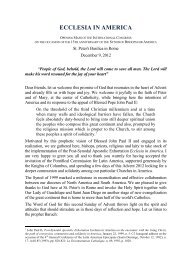CATHOLIC WORD BOOK - Knights of Columbus, Supreme Council
CATHOLIC WORD BOOK - Knights of Columbus, Supreme Council
CATHOLIC WORD BOOK - Knights of Columbus, Supreme Council
You also want an ePaper? Increase the reach of your titles
YUMPU automatically turns print PDFs into web optimized ePapers that Google loves.
without ceasing to be divine. His divine<br />
Person hypostatically unites his divine and<br />
human natures. (2) The supernatural<br />
mystery coextensive with Christ from the<br />
moment <strong>of</strong> his human conception and<br />
continuing through his life on earth; his<br />
sufferings and death; his resurrection from<br />
the dead and ascension to glory with the<br />
Father; his sending, with the Father, <strong>of</strong> the<br />
Holy Spirit upon the Apostles and the<br />
Church; and his unending mediation with<br />
the Father for the salvation <strong>of</strong> human<br />
beings.<br />
Incense: A granulated substance which,<br />
when burnt, emits an aromatic smoke. It<br />
symbolizes the zeal with which the faithful<br />
should be consumed, the good odor <strong>of</strong><br />
Christian virtue, the ascent <strong>of</strong> prayer to<br />
God. An incense boat is a small vessel used<br />
to hold incense which is to be placed in the<br />
censer.<br />
Incest: Sexual intercourse with relatives by<br />
blood or marriage; a sin <strong>of</strong> impurity and<br />
also a grave violation <strong>of</strong> the natural<br />
reverence due to relatives. Other sins <strong>of</strong><br />
impurity desire, etc., concerning relatives<br />
have the nature <strong>of</strong> incest.<br />
Inculturation: The correct and entirely<br />
appropriate adaptation <strong>of</strong> the Catholic<br />
liturgy and institutions to the culture,<br />
language, and customs <strong>of</strong> an indigenous or<br />
local people among whom the Gospel is<br />
first proclaimed. Pope John Paul II Feb.<br />
15, 1982, at a meeting in Lagos with the<br />
bishops <strong>of</strong> Nigeria proclaimed: “An<br />
important aspect <strong>of</strong> your own evangelizing<br />
role is the whole dimension <strong>of</strong> the<br />
inculturation <strong>of</strong> the Gospel into the lives<br />
<strong>of</strong> your people. The Church truly respects<br />
the culture <strong>of</strong> each people. In <strong>of</strong>fering the<br />
Gospel message, the Church does not<br />
intend to destroy or to abolish what is<br />
good and beautiful. In fact, she recognizes<br />
many cultural values and, through the<br />
power <strong>of</strong> the Gospel, purifies and takes<br />
into Christian worship certain elements <strong>of</strong><br />
a people’s customs.”<br />
Index <strong>of</strong> Prohibited Books: A list <strong>of</strong> books<br />
which Catholics were formerly forbidden<br />
to read, possess or sell, under penalty <strong>of</strong><br />
excommunication. The books were banned<br />
by the Holy See after publication because<br />
their treatment <strong>of</strong> matters <strong>of</strong> faith and<br />
morals and related subjects were judged to<br />
be erroneous or serious occasions <strong>of</strong><br />
doctrinal error. Some books were listed in<br />
the Index by name; others were covered<br />
under general norms. The Congregation<br />
for the Doctrine <strong>of</strong> the Faith declared June<br />
14, 1966, that the Index and its related<br />
penalties <strong>of</strong> excommunication no longer<br />
had the force <strong>of</strong> law in the Church. Persons<br />
are still obliged, however, to take normal<br />
precautions against occasions <strong>of</strong> doctrinal<br />
error.<br />
Indifferentism: A theory that any one<br />
religion is as true and good — or false —<br />
as any other religion, and that it makes no<br />
difference, objectively, what religion one<br />
pr<strong>of</strong>esses, if any. The theory is completely<br />
subjective, finding its justification entirely<br />
in personal choice without reference to or<br />
respect for objective validity. It is also self<br />
contradictory, since it regards as equally<br />
acceptable — or unacceptable — the<br />
beliefs <strong>of</strong> all religions, which in fact are not<br />
only not all the same but are in some cases<br />
opposed to each other.<br />
Indulgence: According to The Doctrine<br />
and Practice <strong>of</strong> Indulgences, an apostolic<br />
-39-


